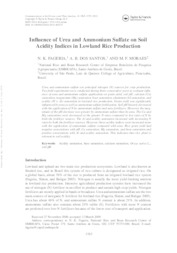Influence of urea and ammonium sulfate on soil acidity indices in lowland rice production.
Influence of urea and ammonium sulfate on soil acidity indices in lowland rice production.
Author(s): FAGERIA, N. K.; SANTOS, A. B. dos
Summary: Urea and ammonium sulfate are principal nitrogen (N) sources for crop production. Two field experiments were conducted during three consecutive years to evaluate influence of urea and ammonium sulfate application on grain yield, soil pH, calcium (Ca) saturation, magnesium (Mg) saturation, base saturation, aluminum (Al) saturation, and acidity (H + Al) saturation in lowland rice production. Grain yield was significantly influenced by urea as well as ammonium sulfate fertilization. Soil pH linearly decreased with the application of N by ammonium sulfate and urea fertilizers. However, the magnitude of the pH decrease was greater by ammonium sulfate than by urea. The Ca and Mg saturations were decreased at the greater N rates compared to low rates of N by both the fertilizer sources. The Al and acidity saturation increased with increasing N rates by both the fertilizer sources. However, these acidity indices were increased more with the application of ammonium sulfate compared with urea. Rice grain yield had negative associations with pH, Ca saturation, Mg saturation, and base saturation and positive associations with Al and acidity saturation. This indicates that rice plant is tolerant to soil acidity.
Publication year: 2010
Types of publication: Journal article
Unit: Embrapa Rice & Beans
Keywords: Acidez do solo, Arroz, Calcio, Oryza sativa, Ureia
Observation
Some of Embrapa's publications are published as ePub files. To read them, use or download one of the following free software options to your computer or mobile device. Android: Google Play Books; IOS: iBooks; Windows and Linux: Calibre.
Access other publications
Access the Agricultural Research Database (BDPA) to consult Embrapa's full library collection and records.
Visit Embrapa Bookstore to purchase books and other publications sold by Embrapa.

